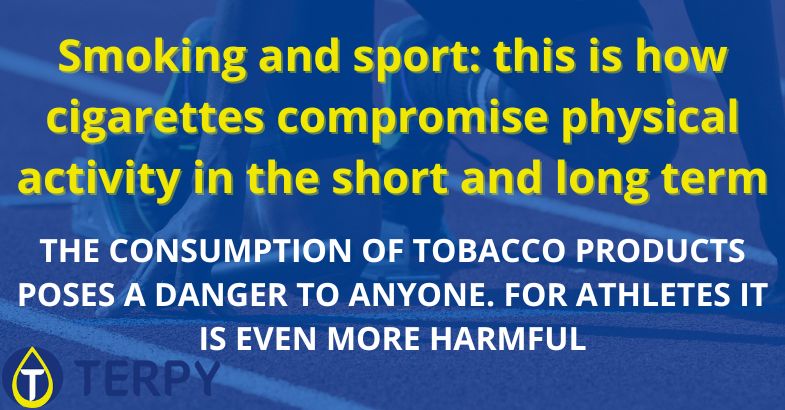Published on: 04/03/2024
THE CONSUMPTION OF TOBACCO PRODUCTS POSES A DANGER TO ANYONE. FOR ATHLETES IT IS EVEN MORE HARMFUL, WITH EFFECTS NOT ONLY ON THEIR GENERAL HEALTH, BUT ALSO ON THEIR PHYSICAL PERFORMANCE
The relationship between smoking and sporting activity has long been the subject of scientific analysis and public interest.
In the context of a healthy and active lifestyle, cigarette consumption emerges as a highly dissonant factor, as it exerts a negative and significant impact on physical and sporting performance. Despite the widespread use of smoking, it is essential to understand how this practice conflicts with the goal of maintaining a healthy and performing body, especially in the athletic field.
We will delve deeper into this topic in the following article.
Short-term effects of smoking on athletes
Cigarette smoking has immediate and tangible effects on the performance of athletes , particularly in disciplines such as athletics, where cardiovascular and respiratory endurance are key. These short-term consequences are crucial to understanding the negative impact of cigarette consumption on physical efficiency and athletic performance.
One of the most immediate effects of smoking is a reduction in lung capacity . In particular, this vice causes an increase in respiratory resistance, which translates into more labored and less efficient ventilation, even in resting conditions. This phenomenon is particularly problematic for athletes, since physical exercise requires greater oxygen intake and faster elimination of carbon dioxide. Consequently, even a single cigarette can compromise performance in training or competitions shortly after inhalation.
Additionally, carbon monoxide produced by burning tobacco binds to hemoglobin in the blood more easily than oxygen, significantly reducing the ability of muscles to oxygenate . This reduction in the supply of the molecule fundamental for the functioning of cells leads to a decrease in muscular resistance and athletic performance, effects that can be felt immediately and which can last for an extended period even after the consumption of a single cigarette.
Importantly, these short-term effects not only compromise sports performance , but can also impact the athlete’s psychological well-being, reducing confidence in their physical abilities and negatively influencing motivation and concentration.
Read also: Are disposable electronic cigarettes really worth it?


How cigarette consumption affects long-term sports performance
Virtually any sport requires high cardiorespiratory and physical efficiency and, as is known, smoking can have a terrible impact on these factors, especially in the long term. The habitual consumption of cigarettes, in fact, leads to physical and functional changes that not only compromise athletic performance, but can also have serious implications on the smoker’s general health.
One of the most significant consequences of prolonged smoking is the progressive deterioration of the functionality of the respiratory system .
Reduced lung capacity, due to chronic exposure to the toxic components of smoke (of which, keep in mind, there are hundreds) limits how effectively the body can use oxygen during exercise. This compromise in respiratory efficiency becomes particularly relevant during sporting activity, when resistance and the ability to manage high volumes of oxygen during exercise are essential for performance.
Long-term smoking also leads to an increased risk of cardiovascular disease , which can further reduce an athlete’s ability to maintain high levels of physical activity. Narrowing of the arteries, increased blood pressure and altered heart rhythm all negatively affect sports performance and can lead to more serious health problems.
Additionally, chronic smoking can also cause deterioration of muscle tissue . The reduction of oxygenation in the latter, caused by the carbon monoxide produced by combustion, can compromise resistance, strength and greatly increase recovery times after physical exercise. These effects may not be immediately evident, but they accumulate over time, progressively reducing the athlete’s capabilities.
Finally, it is important to consider the impact of smoking on athletes’ overall health and long-term well-being. In addition to the direct effects on sports performance, smoking increases the risk of a number of diseases , including various types of cancer, chronic respiratory diseases and cardiovascular diseases, thus compromising the athlete’s sports career and quality of life.
Social perception and impact of advertising on smoking prevalence
The social perception of smoking in the context of sport and its advertising representation are elements that deserve careful analysis, given their influence on the behavior and life choices of individuals, particularly young athletes.
The relationship between sport and cigarette consumption is often contradictory , with smoking being on the one hand stigmatized for its negative effects on health and physical performance, while on the other hand it is occasionally glorified or trivialized in some media and promotional representations.
Tobacco advertising and marketing have in the past used the world of sport as a vehicle to promote their products, using popular sporting events and famous athletes to associate smoking with an image of success, strength and glamour. However, this representation comes into stark contrast with the scientific reality and clinical evidence that highlights the damage of smoking to physical health and sports performance .
For several years there has been a change in the social perception of smoking, with growing recognition of its harmful effects and greater awareness of tobacco marketing strategies. This change has been supported by public health policies and awareness campaigns aimed at educating the public about the risks associated with cigarettes, particularly among athletes and sports enthusiasts.
Despite these positive initiatives, however, a certain ambivalence persists in the perception of smoking , especially among young people. The influence of the media and key figures can still play a role in perpetuating attitudes and beliefs that minimize the risks of smoking or that make it socially acceptable in some contexts.
It is essential to continue to promote correct and responsible information , demystifying the misleading representations of smoking and underlining its real impacts on health and sports performance. This approach will help shape healthier and more conscious attitudes towards smoking, especially among younger generations.
How sport can be the way to win the fight against addiction to traditional cigarettes
Physical activity plays a crucial role as effective tools in the smoking cessation process, offering both physical and psychological benefits that can help overcome nicotine addiction .
Sport, in fact, stimulates the production of endorphins , the so-called “feel-good hormones”, which can help improve mood and reduce stress, often cited as the main reasons for compulsive cigarette consumption. These neurochemical benefits offer a natural alternative to nicotine, helping to manage withdrawal symptoms and counteract the physical and psychological need to smoke-
Additionally, regular physical activity helps stabilize body weight , addressing a major concern of those trying to quit smoking: weight gain. Exercise helps maintain an active metabolism and burn calories, providing a sense of control over your body that can be particularly motivating on your journey to quitting the habit.
Participating in sports and physical activities can also offer a sense of belonging and community , providing social support and a sense of mutual responsibility, which are key elements in overcoming tobacco addiction. Sport also requires and promotes high self-discipline, a quality that can be transferred to managing the desire to smoke.
It should not be forgotten, then, that commitment to sport and the experience of improving one’s physical performance can strengthen the motivation to stop smoking . Professional athletes, but also amateurs, can directly perceive how cigarettes negatively affect their abilities and how, on the contrary, quitting smoking leads to tangible improvements in endurance, strength and general health.


Can the electronic cigarette be a valid alternative for athletes addicted to smoking?
The transition from tobacco to electronic smoking is a topic that is gaining attention, especially among athletes seeking to reduce the negative impacts of smoking on their health and athletic performance.
Although vaping is often perceived as a less harmful choice than smoking traditional cigarettes, it is important to examine this option with an objective, evidence-based analysis.
First of all, using an electronic cigarette means eliminating the combustion of tobacco, which is responsible for the production of tar and numerous carcinogenic compounds present in traditional smoke. This can reduce exposure to harmful chemicals and potentially improve respiratory function, which is crucial for athletes. However, it is important to note that vaping liquids also contain chemicals whose long-term effects are not yet fully understood.
Additionally, vaping can be used as a tool to gradually reduce nicotine addiction . Many devices allow you to control the concentration of this molecule, allowing users to progressively decrease their consumption over time. This can be a helpful step in the process of quitting smoking completely, an important goal for athletes looking to improve their health and physical performance.
However, it is essential to recognize that vaping may not be risk-free in this regard. Research is still ongoing to fully understand the long-term health effects of e-cigarettes.
Read also: The most common vaping mistakes (and how to avoid them)
In conclusion
The interaction between smoking and sporting activity represents a topic of great importance, both for the individual health of athletes and for the broader impact on society
The scientific evidence is clear and unequivocal: smoking has significant negative consequences on physical performance and overall health , limiting lung capacity, reducing the efficiency of oxygen transport and compromising cardiovascular and muscular health. These effects occur in both the short and long term, highlighting the importance of a smoke-free lifestyle for athletes of all levels.
On the other hand, sport presents itself as a powerful tool in the fight against smoking , offering physical and psychological benefits that can help overcome nicotine addiction. Physical activity not only improves overall health, but also provides emotional and social support on the smoking cessation journey.
Transitioning from smoking to vaping may seem like an attractive option for some athletes, but it’s critical to approach this choice with caution and awareness of the potential risks. Although it may offer some advantages over traditional smoking, the e-cigarette has not yet been thoroughly studied and research on the long-term impact of its use is still ongoing.
We hope our article has satisfied your curiosity regarding the impact of smoking on sports performance.
As we have underlined, those who find themselves struggling with this dangerous vice today have a less harmful alternative available which, although not yet fully studied from a medical point of view, undoubtedly allows us to reduce the damage caused to health by the consumption of traditional cigarettes. , naturally with a view to a transition towards a life completely free from smoking , whether electronic or not.
If you’re trying to abandon cigarettes forever, try going down the road of vaping so you can progressively reduce your nicotine consumption and overcome your addiction once and for all . If you are ready to take this step, on Terpy you will find everything you need: electronic cigarettes , concentrated flavours , liquid nicotine and many vaping liquids suitable for any taste.
Take Aways
- Cigarette smoking has immediate effects on lung capacity, compromising ventilation and oxygen intake.
- Carbon monoxide in smoking reduces muscle oxygenation, leading to decreased endurance and athletic performance.
- Chronic smoking causes deterioration of lung function, increasing the risk of cardiovascular disease and compromising the ability to manage physical activity.
- Smoking can damage muscle tissue, reducing endurance and strength over time.
- The portrayal of smoking in the world of sport is contradictory, with advertising in the past associating smoking with a positive image, but a growing awareness of the risks is changing this perception.
- Physical activity stimulates the production of endorphins, helping to improve mood and reduce stress, helping in the fight against nicotine addiction.
- Sport offers a sense of community and self-discipline, contributing to the smoking cessation process.
- E-cigarettes may be a less harmful choice than traditional smoking, but it is important to examine long-term effects with caution.
- Vaping can aid in the gradual reduction of nicotine addiction, but research continues to fully understand its risks.
Questions and answers
What is the effect of smoking on athlete performance?
Smoking has immediate effects on athletes’ performance, compromising lung capacity, reducing the efficiency of oxygen transport and affecting cardiovascular and muscular health. These effects occur in both the short and long term.
How can sport help you quit smoking?
Sport stimulates the production of endorphins, improves mood, reduces stress and can help manage nicotine addiction. Furthermore, regular physical activity helps stabilize body weight and offers social support on the smoking cessation journey.
Is the electronic cigarette a valid alternative for athletes addicted to smoking?
Transitioning from smoking to vaping may seem like an attractive option, but it’s important to approach it with caution. While it may offer some benefits over traditional smoking, research into the long-term impact of its use is still ongoing.










